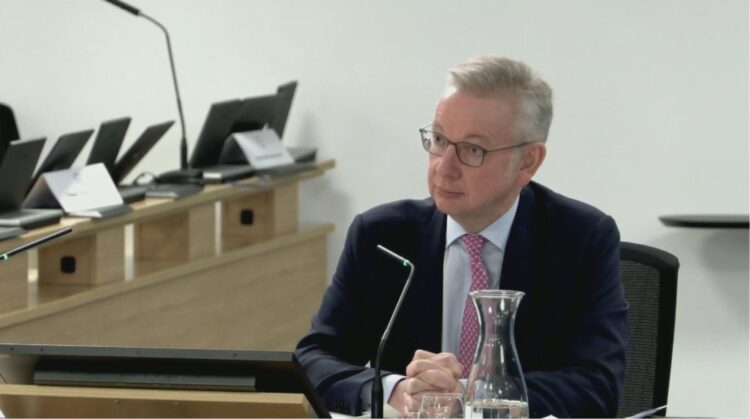By Ben Kerrigan-
Cabinet minister Michael Gove has issued a heartfelt apology to the “victims and families who endured so much loss” due to mistakes made by the government during the Covid-19 pandemic. Gove made this apology while testifying before the Covid inquiry, acknowledging the challenges faced by the government and the human fallibility of decision-makers.
Gove, who was responsible for the Cabinet Office during the first 18 months of the pandemic, emphasized the difficulty of every decision made during the crisis. “Politicians are human beings – we’re fallible, we make mistakes,” he stated during his testimony.
This comes as part of the ongoing inquiry into the government’s response to the pandemic, shedding light on the decision-making process and the challenges faced by officials.
One notable aspect of Gove’s testimony was his defense of Prime Minister Boris Johnson, highlighting the difficulty Johnson faced in imposing restrictions in March 2020 as they went against his instincts.
Gove’s acknowledgment of the challenges encountered at the highest levels of government adds depth to the understanding of the decision-making dynamics during a critical period of the pandemic.
Gove also came to the defense of former Health Secretary Matt Hancock, who has faced criticism for his handling of the early stages of the pandemic. Gove expressed that “too much was asked” of Hancock’s department at the beginning of the crisis, shedding light on the immense pressure faced by key figures in the government.
However, a startling revelation emerged during the inquiry when messages from Gove’s WhatsApp diary were presented.
The messages, exchanged between Gove and former Downing Street aide Dominic Cummings in March 2020, revealed clear doubts and frustrations with the government’s handling of the crisis.
“I don’t often kick off. But we are fing up as a government and missing golden opportunities,” Gove stated in the messages, expressing a sense of urgency and concern. Cummings replied, labeling the cabinet office as a “fing joke” and accusing it of lying about having a plan to deal with the pandemic.
The exchange occurred during a pivotal period that the inquiry is currently focusing on – the early decisions made ahead of the height of the pandemic.
In response to questions of why he did not advocate for a lockdown measure during series of Cobra meetings, including one that he chaired.
Gove’s initial response centered around the “nature of ministerial life,” emphasizing that as the chair of a meeting, the focus is on seeking consensus, even if it means setting aside personal convictions for the collective good of the government.
This notion reflects the delicate balance and intricate dynamics inherent in high-stakes decision-making within the government.
However, when pressed further by Inquiry lead counsel Hugo Keith KC about whether he should have been more forthright in expressing his belief in favor of a national lockdown, Gove conceded, acknowledging the gravity of the situation.
He said: “Generally, people have always been unhappy when I’ve been more forthright in the past, but on this occasion, I should definitely have been more forthright,” he admitted.
Higo Keith pointedly stated, “This was a matter of life and death.” Gove, recognizing the gravity of the situation, responded with a resolute affirmation, saying, “Absolutely, and this is why I think I should have made the decision to implement the national lockdown.”
In this admission, Gove acknowledged the weight of the circumstances and the critical need for decisive action, recognizing that the consequences were not merely political but had profound implications for the health and safety of the population.
The acknowledgment of the need for more assertive action in hindsight reflects a candid assessment of the challenges faced and the potential human cost of the decisions made during that critical period.
Mr Gove eventually apologised for the swearing revealed in his whassap messages. He said: ‘I am sorry for swearing… this sort of thing happens’
Michael Gove has apologised after the Covid inquiry revealed he had sent expletive-filled WhatsApp messages to Dominic Cummings during the pandemic.
The levelling up secretary, then running the Cabinet Office, said: “I apologise to you and to the inquiry and to the public, for expressing myself in the way that I did. I’m sure that you will understand that this sort of thing happens.”




